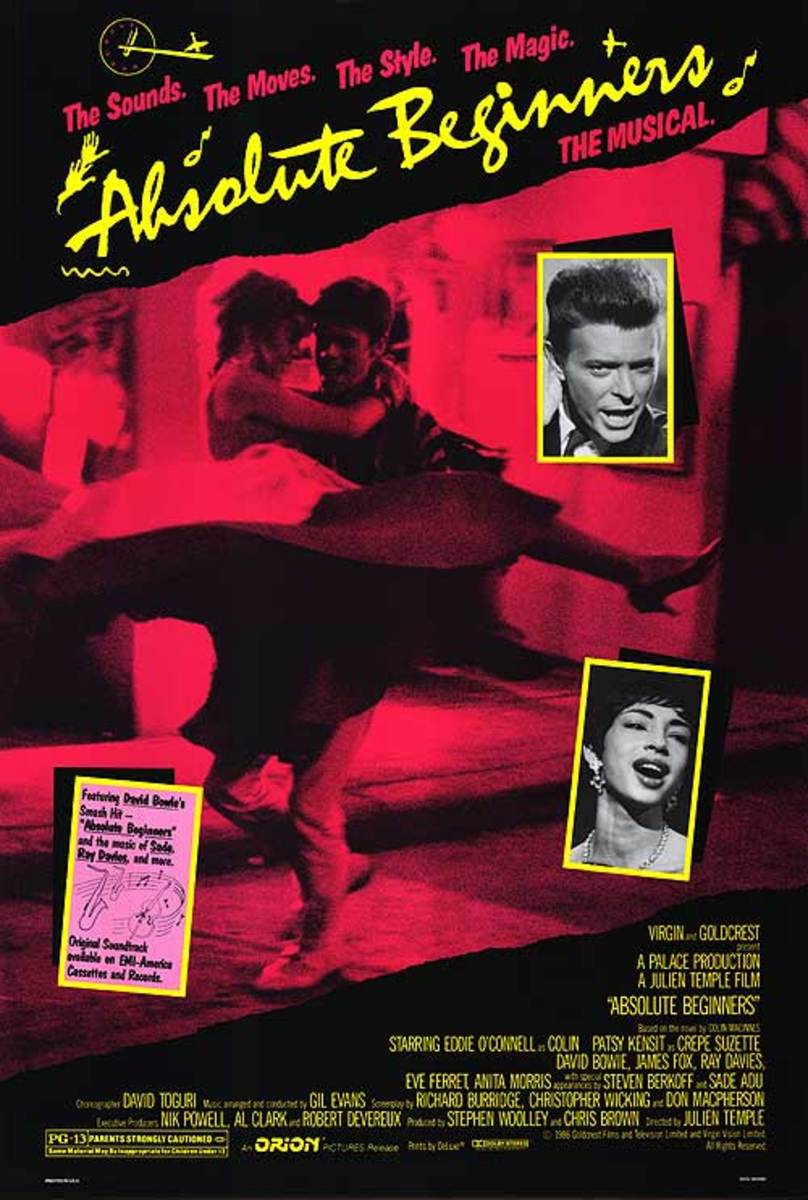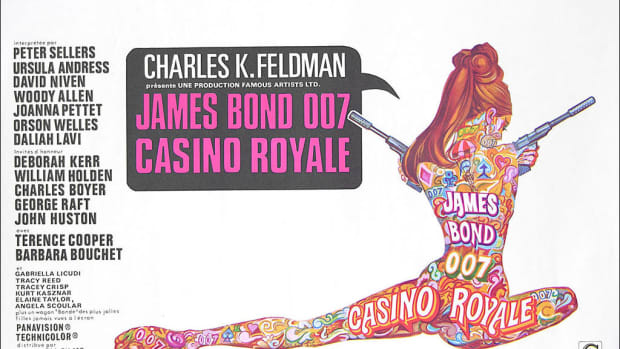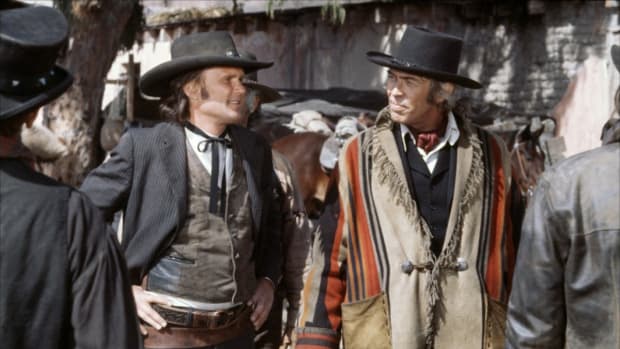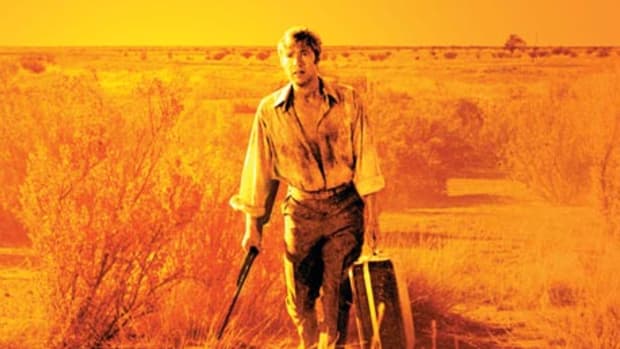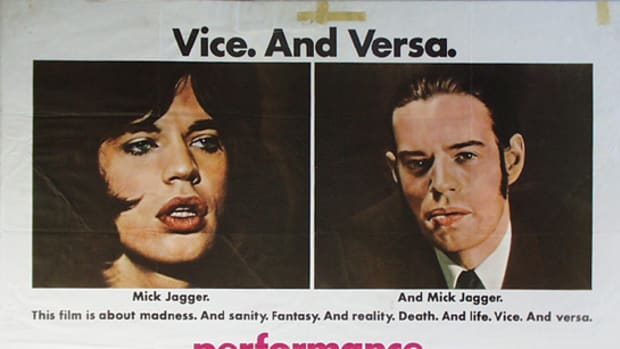Absolute Beginners: Bowie, Kensit & Temple On The Colossal Cock-Up
SHIT PARADE
The people who sold their souls to bring you Absolute Beginners...
Julien Temple - The man who persuaded Sid Vicious to sing 'My Way' in The Great Rock 'N' Roll Swindle, Temple recovered from Absolute Beginners by making another musical Earth Girls Are Easy starring a young Jim Carrey. Now recognised as the king of rockumentary film (The Filth And The Fury, Oil City Confidential)
Stephen Woolley - As cofounder of Palace Pictures, the pony-tailed impresario was instrumental in getting controversial pictures like Scandal and The Crying Game off the ground. Post-Palace, he bankrolled Interview With The Vampire and Michael Collins for Neal Jordan. Recent releases include How To Lose Friends & Alienate People and Brian Jones biopic Stoned, which he also directed.
Nik Powell - Former Virgin big wheel, Powell launched Palace with Woolley Recent-ish films include Ladies In Lavender and Dennis Hopper's Frank Sinatra film The Night We Called It A Day.
Garth Thomas - Line producer hired by Goldcrest when Beginners' costs began to get out of control.
Jake Eberts - Canadian owner of Goldcrest. Exec produced Oscar-winners Dances With Wolves and Driving Miss Daisy.
David Puttnam - British movie mogul behind worthy, Oscar-winning pictures like Chariots Of Fire, The Mission and The Killing Fields.
Michael Caton-Jones - The Scottish director of Memphis Belle and Basic Instinct 2 was still at film school when he was hired to shoot a documentary about the making of Absolute Beginners.
David Bowie - The groundbreaking rock star has been appearing in films for the better part of 40 years for reasons that remain unclear to both his fans and moviegoers. Essays slick advertising guru Venice Partners.
Patsy Kensit - The last person in the world to notice that both Simple Minds and Oasis were shit. Plays ambitious fashion model Crepe Suzette.
Sandy Lieberson - Goldcrest's head of production, Lieberson previously worked as The Rolling Stones' agent and as a producer of highly original British films like Performance and Jabberwocky.
Keith Richards - Rolling Stone-turned-keen amateur pharmacist. Cannot be killed with conventional weapons.
Colin McInnes - groundbreaking author who was no doubt gutted he didn't live to see his acclaimed novel transfer to the big screen.
____________________
Stephen Woolley: There's no such thing as too much hype.
David Puttnam: In 1985, Goldcrest embarked on the simultaneous production of three major movies, Revolution, a historical epic starring Al Pacino budgeted at $15 million; Absolute Beginners, a modern musical budgeted at around $8 million; and one of my own productions, The Mission, a period film starring Robert De Niro and Jeremy Irons, budgeted at $17 million. All three films were partly financed by international distributors. Goldcrest, eager to reap the rewards of success, had been ready to shoulder a significant element of the risk. At these prices, the films would have to succeed in the USA if they were to have any real chance of covering their costs.
"The groundbreaking rock star has been appearing in films for the better part of 40 years for reasons that remain unclear to both his fans and moviegoers."
Julien Temple: There's this tasteful Mafia who exist in Britain and who represent a middlebrow, 'Reader's Digest' form of entertainment which is never going to be hugely commercial. It may win Oscars but it will
never by truly popular. Gandhi, The Killing Fields, Local Hero: all middlebrow crap pretending to be intelligent.
Stephen Woolley: Julien made promos for the likes of David Bowie, Jagger, Sade and Boy George. He was given huge budgets by the record companies, maybe he was even encourage to behave like a rock star.
Julien Temple: I felt when I started making movies that music was a way of making British movies work worldwide because it was that thing at that time that fascinated the rest of the world about England.
Stephen Woolley: The idea of making Absolute Beginners as a musical was what drew us to the project. Otherwise, we probably wouldn't have considered it. Screenwriter Dan McPherson brought me the book. It was a very hip book, like Jack Keroauc. Not only is it enjoyable but it has a sting in its tail, the Notting Hill race riots. Colin MacInnes was one of the first people to recognise racism in this country.
Julien Temple: After having several doors slammed in out faces on Wardour Street, it became clear that we needed to make more investors aware of the saleability of the subject. So, we embarked on a press campaign for MacInnes's novel and drew on everyone in the press to maximise the publicity. In a way, this was the beginning of out undoing. By needing to get this level of publicity to validate Absolute Beginners as a film, we created this monster that by the time we had finished was out of control.
Stephen Woolley: We rushed into production in July/August 1984. It's the only way if you want to get a film made: you have to start, because if you don't star, nobody else will.
Nik Powell: Steve starts while I and everyone else has to catch up. The assembling of the creative talent comes together at a certain point. At that point, you've got to make sure your finance package comes together. So often movie projects fall apart because the talent has come together but the money hasn't or the money comes together but the talent hasn't. One of the skills required by a producer is the ability to keep those two groups in play until they can both be signed off.
David Puttnam: Once a film starts, producing is, for the most part, crisis management: you have no real function. In many respects, you are probably in the way.
Stephen Woolley: The costume people spent money like it was going out of fashion. It's always the same on a big-budget movie. Nobody's guilty, everyone gets inspired by the director and wants to make his vision. And spend a lot of money. It was worse here because there's a feeling: 'this is a big movie, it's got David Bowie, we can spend money'.
David Puttnam: It was when Revolution and Absolute Beginners ran into difficulties and their production costs started to soar that it became apparent how much of a gamble Goldcrest had taken. Both films were bedevilled by creative and logistical problems, some of which were already beyond the control of the producers.
Garth Thomas: Woolley asked me to dinner upstairs at L'Escargot to meet him an the gang. I was never right from the start about the sort of attitude that was coming across about the 'divine right of the director'. Having been wooed by the producers to work on the film, I was somewhat surprised that I still had to earn Temple's stamp of approval to be a line producer. Frankly, that's not the way the business works. Basically I fill in the cracks for the producer, who might tell the director that the film is behind and I'll say: "Yes, by three days and forty-three minutes and you can get ahead if you cut this and that, saving two hours and twenty minutes."
Stephen Woolley: Thomas represented the old school of line management, where it's always easier to say 'no' than 'yes', because you don't have to care about the creative side of the film. We were facing an impossible task. I was trying to contain Julien - who was trying to make three movies at the same time - and a script that should never have been put into production.
Julien Temple: MacInnes's novel has a very flawed narrative to my mind and it is very hard to adapt. It lacks drive in terms of plot and largely concerns the central character's view on the world about jazz, pop stars, television, advertising and so on.
Sandy Leiberson: The script was never nailed down and it kept being edited and not edited during the whole run-up to production and during the production itself.
Michael Caton-Jones: I was frankly appalled by the whole palaver because we were at school trying to shoot films on nothing. We'd stroll through Shepperton and watch all this conspicuous waste going on. Steve, [producer] Chris Brown and Julien were the best dressed people I'd ever come across - really tasteful- and there was an aura of self-declared hippness which was faintly disgusting to anybody outside it. Steve was fascinating because he was such an arrogant son-of-a-bitch. The epitomised the whole king of well-hung young-buck syndrome which stemmed from all these people from pop promos trying to get through.
Stephen Woolley: The producers were in a state of terror, day in day out, because the money was running out.
Julien Temple: The original soundtrack thrust was the Charlie Mingus/MJQ sound. But I wasn't trying to please a few old jazzers. After all, Colin MacInnes was mainly excited by Tommy Steele.
Michael Caton-Jones: We'd turn up on set and be told: "You can't film today. Sade doesn't feel very well."
Julien Temple: Keith Richards laughed at first when we asked him to play the role of Max Miller. But he seriously considered the offer. The amazing thing about meeting Keith is that he still functions as a human being. He's very witty and dry. The weird thing, too, is that he's so well read. He's excellent at Trivial Pursuit.
"Once a film starts, producing is, for the most part, crisis management: you have no real function. In many respects, you are probably in the way."
Keith Richards: I never wanted to be in that film. I'm not an actor. Nor's David Bowie.
David Bowie: I worked in advertising after leaving school and hated it. My boss had this transatlantic accent that kept alternating between New York and cockney. So that's how I played Vendice Partners. I liked playing him. He was a bastard.
Patsy Kensit: At the time we were shooting the film, I thought we were making the best British movie for a long time. I thought this would be a film for the ages, like Alfie. Of course, things turned out rather different. But if I think back to those first days on set, the excitement was on a scale I've never experienced before or since.
Stephen Woolley: One of the oldest stars Slim Gaillard didn't turn up one day. We've got James Fox, we've got Bowie, we've got Kensit but no Slim. He's not there. We freak, ring his agent, anybody I think of who knows Slim and find out that he's on the set of another film, Gun Bus. This 70-year-old jazz performer whose been going for years with nothing to do with movies is suddenly in two films on the same day. He's so excited, he doesn't even bother to tell his agent. He needs the money. And we're fucked. I figure that Gun Bus is probably in better shape than we are so I find out where it's shooting, we go down to the set and during the lunch break kidnap Slim, just bundle him into the car.
Julien Temple: There was a scene in which [Kinks founder] Ray Davies was asked to drive slowly up a county lane. He managed to do it at 100 mph before coming to a halt in a haystack. Then he reversed even faster if that's possible, this time right through the camera and crew. Turns out he'd never learnt to drive.
Garth Thomas: Julien was absolutely right with his wandering shot at the start of the film because that was what he was good at. But the trouble was nobody knew what was landing up on film. There were no shot list because that's the way Julien worked. It was all instinctive stuff. Julien would ask for a Steadicam. 'We haven't got one.' 'Well go out and get one. We've got to have one for this.' Then, if it didn't turn up, he'd o: 'Where the fuck's the Steadicam? Why didn't you do something about this before?' 'Because you never said you needed one.' 'Well, it's obvious I was going to need one!' David Lean never needed a fucking Steadicam and he made some bloody good films.
Michael Caton-Jones: Palace ripped us off something drastic, offering us two thousand quid for 12 weeks work. [Palace exec] Michael Rappaport would complain about some fucking little stickers, saying: "Don't you know how much these cost?" while of course back at the movie, money was bombing everywhere. There were piles and piles of cash just smouldering away.
Garth Thomas: Woolley would come to me and say: "Look, Garth, we'll be absolutely honest with you. This is the new costing. It's £6.75 million and I promise you not a penny more." And I'd say: "Is that it? Is that really it?" "It really is." A week later, he'd call again. "Garth, there's a bit of a problem. It's gone up again." "What?! Why?!" "We just don't know, Garth, but it's £6.85 million." So I say to the board: "Look, chaps, it's going to cost a bit more. We all knew it was to cost a bit more, didn't we? Woolley's got Julien under control now. He's really on top." Four days later, I've got Woolley on the phone again. "Garth, I don't know how this happened. There's one or two things that were missing from the last costing for which I profusely apologise ..."
David Puttnam: What made matters worse was that fact that, as the budgets of Absolute Beginners and Revolution began to climb, so did the value of the dollar against the pound. The sales to the US distributors had been
calculated in dollars. When the original US deal for Absolute Beginners had been struck with Orion, the pound was valued at $1.56. While the movie was being shot, the exchange rate went to approximately $1.06, but all the costs remained in sterling. Orion's payment was originally intended to cover 90% of the budget. By the time the cheque was paid, it covered
barely 60%.
Jake Eberts: It seemed to me that neither Steve nor Nik had a grasp of the extent of the problem, nor did they seem to be expressing the kind of concern that I thought was appropriate in the circumstances. It was overwhelming and I know what the problem is - the budget gets away with you.
David Puttnam: Jake Eberts began to hate what he had developed.
Keith Richards: "I never wanted to be in that film. I'm not an actor. Nor's David Bowie."
Jake Eberts: I saw a rough cut of the film on video. That's when I knew we were in deep deep trouble. I saw very little that was good in the movie except maybe that opening tracking shot and that was the sum total of the movie. I rang Alan Marshall who was a real pro at getting these things under control to oversee the editing and finish the film. Steven resented that, there's no question about it. That's natural. He thought I was old fashioned and passé but what was I to do? The fact is, it was Goldcrest's money and my job was to protect it and certainly what I'd seen on film didn't convince me that we had a hit. At the at stage, it was damage limitation.
Stephen Woolley: I respect Alan Marshall. His problem with the film seemed to stem from the fact that it is very stylised, the kind of cinema he's into is not the kind of cinema that Julien was trying to achieve with
Absolute Beginners.
Julien Temple: You're never going to like a guy who locks the director out of the cutting room of a film that you've lived and breathed for three years and was almost as precious as life. I should have done what Mickey Rourke did with Marshall on Alan Parker's Angel Heart and just fought him and then it would probably have had more effect. It was like having a savage Rottweiler set on us to fuck us up.
Garth Thomas: Goldcrest held a press screening where they showed clips from The Mission, Revolution, A Room With A View and Absolute Beginners. When the screening was over, the Absolute Beginners team were left at our table, rowing with each other. It was going full pelt. It was one of those classic scenes where the bottles of wine are puled up all round the table and there's lots of 'fucking this and fucking that'. Fortunately, we were the only ones left when it got leery. Alan Marshall turned to [Palace suit] Mike Brown and said: "You don't know anything about fucking London! You're not a real Londoner!" Then Brown said: "How dare you say that! I live in Brixton!" "Yeah, but not real Brixton. Not with the blacks and all that." "Yes, I do! I'm as much a Londoner as you are!" That's when Brown took a swing at Marshall. I tried to separate them but they wouldn't have it.
Julien Temple: I said to Steve: "This can't go on." That's when the table collapsed. The manager asked us to leave. Garth lost his watch.
Stephen Woolley: Palace were the new boys who I admit did have a reputation for being arrogant sods. But there's no doubt that Goldcrest used us as whipping boys for their problems. We learned an awful lot on the film and I don't feel ashamed or embarrassed. I didn't do anything that was outrageously irresponsible.
Julien Temple: There was a feeling in the industry that we should be spanked. By the end of the film, I was aware that a long dark cloud had come down.
Patsy Kensit: We probably thought we were inventing the future - it was easy to feel that ambitious in those times. In the end, we made a film that not enough people wanted to see.
Stephen Woolley: This is a bitchy business and you get used to the criticism. All I can say is that the film is unique.
Colin McInnes: It would be possible to see in the teenage neutralism and indifference to politics and self-sufficiency and instinct for enjoyment - in short, in their kind of mindlessness - the raw material for crypto-facsisms of the worst kind.
The Absolute Beginners: 30th Anniversary Edition is available now from Second Sight.
Click here for more stories about TV & Film
Click here to follow Sabotage Times on Twitter
Click here to follow Sabotage Times on Facebook
